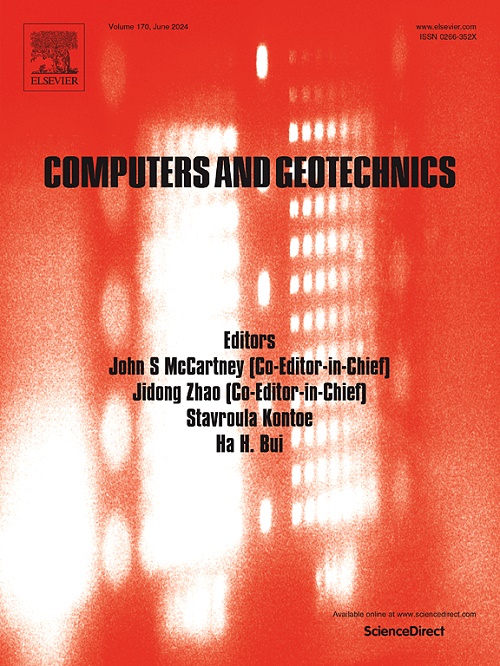地下水平流条件下具有水平贯通粗糙断裂的胶结回填热交换器的传热特性研究
IF 5.3
1区 工程技术
Q1 COMPUTER SCIENCE, INTERDISCIPLINARY APPLICATIONS
引用次数: 0
摘要
在深矿井井口提取地热能的最有效方法之一是在水泥回填体中安装热交换管。然而,复杂的地下环境会导致回填体断裂,从而对地热提取性能产生负面影响,尤其是在存在地下水流的情况下。本研究通过有限元软件平台,建立了具有水平贯穿性粗糙裂缝的胶结回填热交换器的三维渗流和传热耦合模型。该模型采用蒙特卡洛法结合线性滤波法生成粗糙断裂。研究结果表明,对于 0 至 0.3 毫米的裂缝孔径,主要的热传导机制是热传导,地下水流的贡献微乎其微。然而,当孔径从 0.3 毫米扩大到 2 毫米时,地下水流显著增强了热传导,超过 2 毫米后趋于稳定。在孔径为 0.2 毫米时,裂缝粗糙度的增加并不会提高热交换管的热回收性能,但在孔径为 4 毫米时,粗糙度与热传递之间出现了强烈的正相关。因此,狭窄的裂缝可视为光滑的,而较宽的裂缝则必须考虑粗糙度。裂缝流动与达西渗流之间的相互作用随着地下水水头的增加而增强,从而显著改善了换热管的汲取热量性能。当相对位置从 0.75 °C 过渡到 0 °C 时,换热管的出口水温上升了约 9 °C。本文章由计算机程序翻译,如有差异,请以英文原文为准。
Study on the heat transfer characteristics of cemented backfill heat exchangers with a horizontally penetrating rough fracture under groundwater advection
One of the most effective methods for geothermal energy extraction in deep mine stopes is the installation of heat exchange tubes within cemented backfill bodies. However, the complex underground environment can cause fracture in the backfill, which may negatively affect the geothermal extraction performance, especially in the presence of groundwater flow. This study establishes a three-dimensional seepage and heat transfer coupling model of cemented backfill heat exchangers with horizontal penetrating rough fractures via a finite element software platform. The model employs the Monte Carlo method combined with linear filtering to generate a rough fracture. The findings demonstrate that for fracture apertures ranging from 0 to 0.3 mm, the predominant mechanism of heat transfer is thermal conduction, with a negligible contribution from groundwater flow. However, as apertures expand from 0.3 mm to 2 mm, groundwater flow significantly enhances heat transfer, stabilizing beyond 2 mm. Increased fracture roughness at a 0.2 mm aperture does not enhance the heat recovery performance of the heat exchange tubes, but at a 4 mm aperture, a strong positive correlation between roughness and heat transfer is observed. Thus, narrow fractures can be treated as smooth, whereas roughness must be considered for wider fractures. The interaction between fracture flow and Darcy seepage increases with increasing groundwater hydraulic head, resulting in a notable improvement in the heat extraction performance of the heat exchange tube. When the relative position transitions from 0.75 °C to 0 °C, the outlet water temperature of the heat exchanger tube increases by approximately 9 °C.
求助全文
通过发布文献求助,成功后即可免费获取论文全文。
去求助
来源期刊

Computers and Geotechnics
地学-地球科学综合
CiteScore
9.10
自引率
15.10%
发文量
438
审稿时长
45 days
期刊介绍:
The use of computers is firmly established in geotechnical engineering and continues to grow rapidly in both engineering practice and academe. The development of advanced numerical techniques and constitutive modeling, in conjunction with rapid developments in computer hardware, enables problems to be tackled that were unthinkable even a few years ago. Computers and Geotechnics provides an up-to-date reference for engineers and researchers engaged in computer aided analysis and research in geotechnical engineering. The journal is intended for an expeditious dissemination of advanced computer applications across a broad range of geotechnical topics. Contributions on advances in numerical algorithms, computer implementation of new constitutive models and probabilistic methods are especially encouraged.
 求助内容:
求助内容: 应助结果提醒方式:
应助结果提醒方式:


